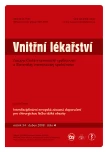-
Medical journals
- Career
Lyme carditis – rare cause of dilated cardiomyopathy and rhythm disturbances
Authors: J. Čepelová 1,2
Authors‘ workplace: Interní klinika 1. lékařské fakulty UK a ÚVN Praha, přednosta doc. MUDr. Miroslav Zavoral, Ph. D. 1; II. interní klinika 1. lékařské fakulty UK a VFN Praha, přednosta prof. MUDr. Aleš Linhart, DrSc. 2
Published in: Vnitř Lék 2008; 54(4): 430-433
Category: Case Report
Overview
Case report of young woman presents involvement of dilated cardiomyopathy and rhythm disturbances in 18 months after infection of tick, with direct assessment of spirochetes in myocardial tissue. Cardial decompensation occured after asthma exacerbation, complicated by bronchopneumonia. Rhythm disturbances and heart failure gradually subside after parenteral antibiotic treatment and peroral treatment of heart failure. Nevertheless there is a long-lasting persistence of dilated cardiomyopathy with significant systolic dysfunction, which is supposedly last consequence of Borrelia infection. Resynchronic therapy combinated with cardioverter-defibrilator primary considering was postponed for improvement clinical condition and myocardial electric stability. There is demonstrating complicated serologic diagnostics of Lyme disease in discussion. Lyme carditis would be part of differential diagnosis in rhythm disturbances and cardiomyopathy of unknown etiology, including serious or fatal events.
Key words:
lyme borreliosis – lyme carditis – arrhythmia – atrioventricular blockade – dilated cardiomyopathy
Sources
1. Artiago R, Torres G, Guerrero A et al. Irreversible complete heart block in Lyme disease. Am J Med 1991; 90 : 531–533.
2. Bartůněk P, Goričan K, Hulínská D. Borreliová infekce jako příčina dilatační kardiomyopatie. Vnitř Lék 2004; 50(Suppl 1): 123.
3. Bartůněk P et al. Lymeská borelióza. Praha: Grada Publishing 2006 : 21–118.
4. Berglund J, Eitrem R, Ornstein K et al. An epidemologic study of Lyme disease in Southern Sweeden. N Engl J Med 1995; 333 : 1319–1327.
5. Gasser R, Horn S, Reisinger E et al. First description of recurrent pericardial effusion associated with Borrelia burgdorferi infection. J Cardiol 1998; 64 : 309–310.
6. Honegr K, Dostál V. Klinické projevy a léčba lymeské boreliózy. Klin Mikrobiol Inf Lék 2004; 10 : 5–10.
7. Janovská D. Epidemiologie Borrelia burgdorferi. In: Bartůněk P et al. Lymeská borrelióza. Praha: Grada Publishing 1996 : 12–16.
8. Klein J, Stanek G, Bittner R et al. Lyme borreliosis as a cause of myocarditis and heart muscle disease. Eur Heart J 1991; 12(Suppl D): 73–75.
9. van der Linde MR. Lyme carditis: cardiac characteristics of 105 cases. Scand J Infect Dis 1991; 77(Suppl): 81–84.
10. Midttun M, Lebech AM, Hansen K et al. Lyme carditis: A clinical presentation and long time follow-up. Scand J Infect Dis 1997; 29 : 153–157.
11. Rubin DA, Sorbety C, Nikitin P et al. Prospective evaluation of heart block complicating early Lyme disease. Pacing Clin Electrophysiol 1992; 15 : 252–255.
12. Sangha O, Philips CB, Fleischmann KE et al. Lack of cardial manifestations among patients with previously treated Lyme disease. Ann Intern Med 1998; 128 : 346–353.
13. Švand J, Rosenfeld L, Schoen RT. Lyme carditis. In: Axford JS, Rees DHE (eds). Lyme borreliosis. New York: Plenum Press 1994 : 21.
14. Vlay SC, Dervan JP, Elias J et al. Ventricular tachycardia associated with Lyme carditis. Am Heart J 1991; 121 : 1558–1560.
15. Wetherill PE, Schoen RT. Clinical manifestation of Lyme Disease. Mediguide to Infectious Disease. New York: N.Y.: Lawrence DellaCorte Publications Inc 1995; 15 : 1–5.
Labels
Diabetology Endocrinology Internal medicine
Article was published inInternal Medicine

2008 Issue 4-
All articles in this issue
- Pericardiocentesis after cardiac surgery – our experience
- Higher incidence of thyropathy in patients with oesophageal achalasia. Genetic, autoimmune, regional or just a random association?
- Possibilities of evaluation of changes of glomerular filtration rate estimated on the basis of predicting formulas
- Traditional risk factors of atherosclerosis in patients with obstructive sleep apnoe-hypopnoe syndrome
- Results of the PREDICTIVE project in the Czech Republic
- Pathogenesis of insulin resistance in different endocrinopathies
- Exenatid and its position as antidiabetic drug in the treatment of type 2 diabetes mellitus
- Hypoglycaemia
- The importance of determining the viability of the myocardium prior to revascularisation in patients with ischaemic cardiomyopathy and left ventricular systolic dysfunction
- Human leukocyte differentiation antigens and CD classification
- ECG changes in alcoholic intoxication
- Preparation of patients with haemostasis disorder for dental surgery
- Lyme carditis – rare cause of dilated cardiomyopathy and rhythm disturbances
- Internal Medicine
- Journal archive
- Current issue
- Online only
- About the journal
Most read in this issue- Pericardiocentesis after cardiac surgery – our experience
- Lyme carditis – rare cause of dilated cardiomyopathy and rhythm disturbances
- ECG changes in alcoholic intoxication
- Human leukocyte differentiation antigens and CD classification
Login#ADS_BOTTOM_SCRIPTS#Forgotten passwordEnter the email address that you registered with. We will send you instructions on how to set a new password.
- Career

